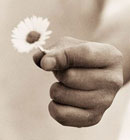Quality #2: Kindness
Kindness – in which we can include love, compassion, good will, helpfulness, generosity, forgiveness, and a general interest in others’ welfare – is, of course, the very cornerstone of any meaningful spiritual practice. One could even say that it is definitive of it.
Kindness is the heart of the spiritual way of life; it is, one could argue, the whole enchilada. “My religion,†the Dalai Lama has famously declared, “is kindness.â€
As we begin our spiritual training, we learn to subdue our deeply entrenched selfish inclinations and cultivate a more altruistic outlook. Kindness towards others acts as the antidote to our natural tendency toward egoistic self-aggrandizement. We try to become better human beings by un-learning our habitual inclination to worry always and only about ourselves.
There are many methods to help us cultivate selflessness and kindness toward others, but perhaps all of them can be reduced to the recognition that we are all the same when it comes to our basic desires. Others are just like ourselves – they too just want to be happy and avoid suffering – and they have exactly the same claim to these rights that we do. “Love your neighbor as yourself,†said Jesus, and this sentiment is reiterated in the Buddhist classic, the Guide to the Bodhisattva’s Way of Life:
From the very beginning exert yourself in the practice of treating others and yourself the same. When the happiness and sufferings are the same, than you will care for all just as you do yourself. (8.90)
In the first years (decades?) of our spiritual path we are fighting against our deeply entrenched habit of thinking exclusively about ourselves. We know all too well that we just want to enjoy life and avoid pain and unpleasantness, and we train ourselves to acknowledge that others feel the same. We know how we want other people to treat us, and we extrapolate from that to imagine how others would wish to be treated by us. We put ourselves in others’ shoes and try to see things from their perspective.
But as time passes, we may come to realize that we need to think more deeply and with a more nuanced understanding about what kindness towards others really entails. Cultivating a more sophisticated version of this virtue requires us to move beyond a simple warm and fuzzy sentimentality. “Grandmother love,†as Chogyam Trungpa Rinpoche called it – the kindness that manifests as extreme gentleness and benignity – is not always the kindest thing you can do for another person. The object of your concern may need a bit of “tough love†instead of a grandmother love that ends up just encouraging and enabling more self-destructive thinking and behavior.
Of course, tough love can simply function as an excuse to bully others if selfishness and our own inexhaustible ego needs are not taken out of the equation. As our spiritual practice matures and ages, we become more and more aware of the many and often subterranean strategies the self deploys to enhance itself. “Being kind†(in either the grandmotherly way or in the tough love modality) can become just another such self-seeking scheme, masking a deep-seated obsession about whether others like you and think of you as a “good person†or respect and fear you as their moral supervisor and cosmic boss.
“True compassion,†writes Trungpa Rinpoche, “is ruthless, from the ego’s point of view, because it does not consider ego’s drive to maintain itself.†A deeper, less self-interested form of kindness involves getting your ego out of the way altogether in order to do what is best for another – even when the other might not like you, praise you, or be grateful to you for doing so.
Another manifestation of a more fully developed take on kindness involves turning it towards oneself – not in the old, egotistical way but in a manner that spawns self-acceptance rather than self-centeredness.
Practitioners, like so many others in our modern culture, are susceptible to a particularly virulent form of self-absorption – depression and low self-esteem. Thinking about oneself and how bad we feel is still thinking about oneself and not about others. And with a little misunderstanding, we can perversely convince ourselves that self-pity is a sign of selflessness and that feeling like a loser is self-sacrificial.
A mature practitioner fully comprehends that being dejected and unhappy is not an advanced spiritual attainment. On the contrary, such gloomy self-indulgence is just another ego ploy. In order to combat it, we learn to exercise kindness towards ourselves in the form of forgiveness.
Anyone who has labored on a genuine spiritual path will have been encouraged from the start to forgive others who have hurt or angered us. But we must also learn to forgive ourselves for our failures and shortcomings, realizing that we are in this regard also just like other people. We too make mistakes. And we too deserve forgiveness.
In the spiritual life, we do have our little successes. But far more often, trying to live a good life is shot through with failure: we regularly fail to live up to the expectations we have of ourselves, to our own ideals, and to our highest goals. Instead of using failure and disappointment as excuses to give in to narcissistic pity, as mature practitioners we will treat ourselves as we have learned to treat others who fail.
We forgive.
And then we move on.
We get back on the job of working to become helpers who practice kindness to others instead of helpees who demand only the kindness of others. We doggedly, patiently, and cheerfully keep on keepin’ on, knowing that there’s nothing else nearly as important to be doing with this short and precious life.
===
 At the end of his modern spiritual classic, A Path With Heart, Jack Kornfield reviews ten qualities that he thinks characterize someone who has “come of age†in their spiritual life. The ten traits Kornfield identifies have inspired me to write down some of my own thoughts about each of them.
At the end of his modern spiritual classic, A Path With Heart, Jack Kornfield reviews ten qualities that he thinks characterize someone who has “come of age†in their spiritual life. The ten traits Kornfield identifies have inspired me to write down some of my own thoughts about each of them.
I explore the subject of forgiveness at greater length in Chapter Four (“Preemptive and Unilateral Forgiveness: Ending the Repeated Resurrection of Frankenstein’s Monsterâ€) of my forthcoming book, A Spiritual Renegade’s Guide to the Good Life. To order your copy, click here:


